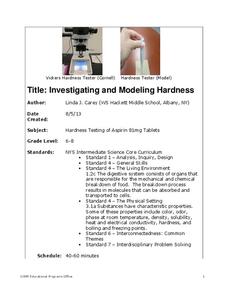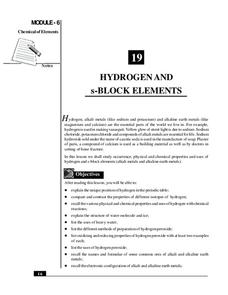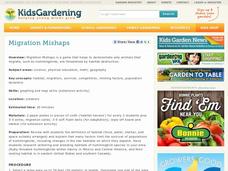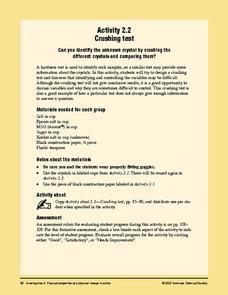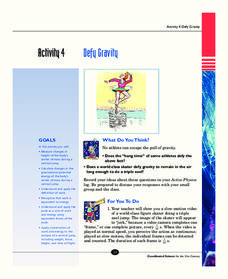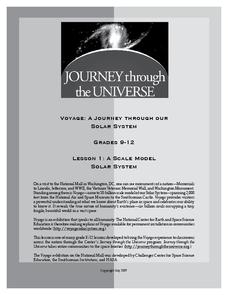New Mexico State University
Lab 6: Kepler's Laws
A 15-page package thoroughly teaches your physics or astronomy learners about Kepler's three laws of planetary motion. Each one is stated and explained. Class members answer questions, solve problems, and participate in the classic...
It's About Time
AC and DC Currents
An informative physics lesson includes two teacher demonstrations, one on AC currents and the other on DC currents, allowing pupils to take notes while watching. The resource includes questions to assign as homework or during class...
It's About Time
A Running Start and Frames of Reference
Ttake learning to the next level! Individuals research inertial mass, a physical property of matter, and apply what they learn through a series of activities designed to stimulate the senses. They demonstrate Galileo's Principle of...
It's About Time
Push or Pull - Adding Vectors
Demonstrate Newton's Second Law of Motion with an engaging lesson. Individuals explore the difference between forces in relation to a push or a pull, and they identify various forces that cause an object to move. They explore the concept...
It's About Time
Newton's Law of Universal Gravitation
While science is looking for correct explanations, pseudoscience often fills in the blanks. Pupils explore the relationship between light distance and intensity and graph their data. Then they compare their data to Newton's Law of...
Intel
Lights, Camera, Reaction!
Excite classes with a STEM project-based learning lesson covering chemical reactions. Groups study the different types through simulations and hands-on activities. They pick one type (synthesis, decomposition, single displacement, double...
Cornell University
Investigating and Modeling Hardness
Model hardness testing with a self-designed hardness test. Young scholars rate the hardness of different types of aspirin using the Vicker's Hardness scale. They then relate hardness to the solubility of each aspirin tablet.
BioEd Online
Good Stress for Your Body
Stress the importance of the different types of pressure our mind and body experience in a lesson about how certain types of stress are actually necessary and good for our bodies. As astronauts and people with injuries can attest, not...
National Institute of Open Schooling
Hydrogen and s-Block Elements
Lesson 19 in the series of 36 analyzes the element hydrogen and the s-block elements. Through readings, answering questions, and discussion, learners write about and explain their occurrence, physical and chemical properties, and uses.
Curated OER
Concrete for Kids
Although preparation-intensive, this would be an unforgettable experience in materials engineering. Stimulate learners' curiosity with a slide show and then introduce them to the components of concrete. Small groups mix and pour concrete...
National Gardening Association
Migration Mishaps
Elementary ecologists pretend to be migratory hummingbirds. They fly between wintering and nesting grounds, trying to reach a habitat haven. In a musical-chair fashion, some birds will miss out, and are removed from the game. To further...
American Chemical Society
Crushing Test
Solidify understanding of the properties of crystals by crushing them to compare hardness. After some class discussion, a procedure is planned, and then small groups go about making observations as they crush five different crystal...
It's About Time
Building a Motor/Generator Toy
Combine science and playtime with the final lesson in an innovative unit. Scholars apply everything they have learned in previous lessons to build their own motors/generators and use it in a toy of their own design.
It's About Time
Defy Gravity
Test the limits of gravity while encouraging full class participation with this thrilling lesson. Pupils investigate the meaning of work and how it is equivalent to energy. They explore the joule and apply it as a unit of work. They...
It's About Time
Life (and Fewer Deaths) After Seat Belts
Seat belts reduce serious crash-related injuries and deaths by about half. Scholars continue crashing their cart with a crash test dummy into a wall, but this time, they experiment with different types of seat belts to reduce injuries....
It's About Time
Inferences of Waves
Building on the previous lesson, scholars use Slinkies to create standing waves. They graph waves on a calculator and then apply their knowledge to both sound and light waves. This is the fourth in a series of nine lessons.
It's About Time
A Moving Frame of Reference
We often remind pupils to cite their references, but this lesson helps them understand there are many frames of reference. Scholars experiment with throwing a ball straight up in the air and catching it. Then they must do it again while...
Journey Through the Universe
A Scale Model Solar System
Between the time scientists discovered Pluto and reclassified it as a dwarf planet, it did not even make one full revolution around the sun. In two activities, scholars investigate scale models and their properties. Pupils find that it...
NASA
Measuring Dark Energy
You're only 10 minutes late? Do you know how much the universe has expanded in those 10 minutes? Scholars graph supernovae based on their redshift and see if the results verify Hubble's Law. If it does confirm it, the universe is...
Teach Engineering
The Great Pacific Garbage Patch
The Great Pacific Garbage Patch is one of several garbage patches around the world where garbage accumulates naturally. As part of a GIS unit that combines oceanography, environmental science, and life science, class members investigate...
NASA
Determining the Nature, Size, and Age of the Universe
Prompt scholars to discover the expansion of the universe themselves. Using photographs of other galaxies, they measure and then graph the size and distance of each. Finally, they draw conclusions and prove the universe is expanding.
It's About Time
Conservation of Momentum
Assist your class with understanding collisions as they apply the Law of Conservation of Momentum. Pupils measure the momentum before and after manipulation of two objects so that one strikes another in an inelastic collision. The lesson...
It's About Time
Life (and Death) Before Seat Belts
Did you know only 80-90% of passengers wear a seat belt in a moving car? Young scholars use clay and a cart to complete an experiment about what happens without a seat belt in a collision. The lesson includes Newton's Second Law of...
It's About Time
Force Fields
Young scholars investigate both bar and horseshoe magnets. They explore force fields with a compass and iron fillings before making an electromagnet. This is the first in a series of nine lessons.








